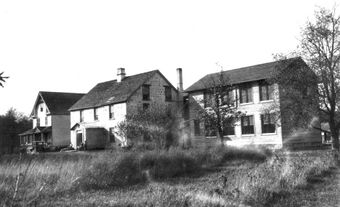This article was originally published in Maclean's Magazine on January 12, 1998
HRT Conundrum
Nicole Mitchell seems visibly relieved to have found someone to listen as she runs through her list of menopause symptoms. "I can't begin to tell you how nice this is," she beams to the clinical nurse specialist at Montreal's Jewish General Hospital who has peppered her with questions about her condition and medical history. The midlife transition hit Mitchell with a thud in 1996, shortly after her 50th birthday, when her period was three weeks late. "I wasn't prepared mentally," says Mitchell, manager of a gourmet gift shop. Frustrated for a year by her inability to get at the root of her "pains and aches," Mitchell sought help from the hospital's McGill Menopause Clinic. Since starting hormone replacement therapy a year ago, she feels more energetic. But her chronic migraines have worsened and bouts of sleeplessness leave her wide-eyed at 3 a.m. "I've had so many questions," says Mitchell.
And so do many of the 50 million baby boomer women across North America who will reach menopause by the year 2000. Their midlife transition has helped spark a flurry of research activity into the condition. Paradoxically, however, some experts believe the terrain is becoming more confusing for women. That is because the options for treating symptoms are increasing and the information about health risks associated with one particularly popular treatment - hormone replacement therapy - is sometimes conflicting. "I started reading five years ago," says Anna, 51, a Montreal hospital worker visiting the McGill clinic, who requested anonymity to protect her privacy at work. Her research involved reading "everything I could get my hands on," she says, including articles, books and medical encyclopedias.
Many boomer women are tackling menopause with similar vigor. Dr. Miroslava Lhotsky, who set up a menopause clinic in an upscale Toronto neighborhood in 1991, calls the baby boomers a "very challenging" group. "Sometimes I feel I can never read enough because they know every article," Lhotsky says with a wry smile. But being so well informed can present a problem for some women, according to Lhotsky. "They know all this information, but they don't know how to sort it out for themselves," she says.
The biggest dilemma for many women revolves around whether to go on the controversial hormone replacement therapy to relieve menopausal symptoms such as hot flashes and night sweats. Despite its possible association with breast cancer, some women also opt for HRT on a long-term basis as a defence against heart disease and osteoporosis. An estimated 15 to 20 per cent of menopausal women in Canada are on HRT - taking, in most cases, a combination of hormones including estrogen.
Some doctors believe more women will follow suit because of HRT's known benefits, which include preventing post-menopausal changes to the vagina, such as dryness and atrophy. During menopause, a woman's production of the female hormone estrogen - which helps protect against heart disease and bone loss - drops off significantly. Studies show that HRT can reduce the risk of heart disease and help prevent or slow the onset of osteoporosis, the bone loss that makes one in four women over 50 more vulnerable to fractures. "I'm concerned about osteoporosis," says Mitchell, a petite woman who weighs about 100 lb. With no family history of breast cancer, she says she is prepared to take hormones into her 70s, and professes no more concern about taking HRT than "going outside and breathing the air that is polluted."
Some women are less sanguine. "There is still the feeling that drugs are drugs whether they are hormones or what have you," says Dr. Morrie Gelfand, a professor of obstetrics and gynecology at McGill University and co-director of the McGill Menopause Clinic. Like other doctors, Gelfand finds that breast cancer is the biggest concern of menopausal women considering HRT. Doctors do agree that family medical history, particularly the incidence of heart disease or breast cancer, should be factored into any decision to take HRT for a long period.
The link between breast cancer and hormone therapy remains controversial and the subject of continuing scrutiny. There is little evidence that short-term use of hormones increases the risk, but questions remain about the long-term effects. "We know that the risk increases slightly the longer women are on HRT," says Dr. Barbara Whylie, director of medical affairs and cancer control at the Canadian Cancer Society. "But we also know that more women die of heart disease than breast cancer," she adds, noting that opting to use hormones is "very much an individual choice." In fact, heart disease is by far the leading cause of death among women - it kills about 25,000 each year, while breast cancer kills roughly 5,000.
Now, drug companies are trying to develop new varieties, so-called designer estrogens, to provide the same benefits as existing estrogen but without an associated risk of breast cancer. In November, an advisory panel recommended to the U.S. Food and Drug Administration that it approve raloxifene, the first of that new generation of drugs, designed to combat osteoporosis.
Some people believe that the HRT issue should also be cast in terms of women's longevity. Many Canadian women now live into their 80s, which means that a third or more of their life follows menopause. "What we need to talk about is the quality of life of those later years, not just the fact that people are staying alive," says Dr. Barbara Sherwin, a renowned McGill University professor who has researched the effects of estrogen loss for more than 15 years. By the age of 65, a woman's risk of heart attack almost equals that of a man. And one in four women over 50 have osteoporosis, increasing their risk of hip, wrist and spine fractures. "Is there anything we can do to keep this 80-year-old woman living independently and enjoying her life?" wonders Sherwin. "I think those are the ultimate questions for me."
Some menopause experts question the "medicalizing" of the condition. "There is enormous pressure to go on hormone therapy," complains Jannine O'Leary Cobb, 64, the Montreal author of Understanding Menopause and founder of a 13-year-old menopause newsletter called A Friend Indeed. Although she believes HRT is a "perfectly appropriate choice for some women," Cobb says she parts company with many doctors over the emphasis on pills. As someone with no family history of early heart disease, Cobb feels no need to take HRT. "I would rather go the other route," she says, "and exercise to keep my bones and heart healthy."
Other women are turning to herbal remedies and natural alternatives during menopause. Plant estrogens - also called phytoestrogens - found in flaxseed and some soy products, for example, have garnered considerable attention. Some doctors, however, caution that natural is not necessarily synonymous with safe. Dr. Wulf Utian, executive director of the Cleveland-based North American Menopause Society, laments the fact that the proper dosages in some products are unknown. They have not been tested like prescription drugs, he says. "I think that they should be subjected to the same scrutiny in the interests of women's health," says Utian. "And there should be some sort of limitations on claims that you can make on a product if it hasn't been tested."
Although many women experience varying degrees of discomfort from hot flashes and other menopause symptoms, only about 25 per cent seek medical help. In fact, many women may be looking at menopause in a positive light. A recent poll conducted for the North American Menopause Society found that more than half of women aged 45 to 60 see it as the start of a new and fulfilling stage of life. The findings represent an attitudinal shift, according to Utian, who believes baby boomers are changing views towards menopause just as they did with childbirth.
Still, it is not an easy transition for some women. While menopause does not cause depression, some doctors believe menopausal women are more vulnerable to it because of their fluctuating hormones. Menopause is frequently accompanied by other major life changes, such as children leaving home, that can provide additional stresses. "Attitude is very important in coping with menopause," says Dr. Janet Takefman, a psychologist and co-director of the McGill Menopause Clinic. "The psychological literature shows that women who view it positively have an easier time."
Anna appears to fit that description. Her symptoms include weight gain, mild hot flashes and irritability. "But I find it natural and I've just accepted it as such," she says matter-of-factly. Unlike Mitchell, she is loathe to go on HRT because she dislikes taking medication. She and Mitchell will soon head back to the McGill Menopause Clinic to discuss their symptoms, sift through their choices with help from a psychologist, a dietitian and a gynecologist. They are also pencilled in for bone density measurements and blood tests to check their hormone levels, and the clinic's nurse specialist has urged them to get mammograms and cholesterol tests. Both women profess a zest for life and see menopause as a time to take stock of their health to prevent future illnesses. "Rather than waiting and face a disaster," says Anna, "I thought I'd see where I stand in terms of good health." It's a take-charge attitude shared by many baby boomer women at a watershed period of their lives.
Maclean's
January 12, 1998

 Share on Facebook
Share on Facebook Share on X
Share on X Share by Email
Share by Email Share on Google Classroom
Share on Google Classroom


